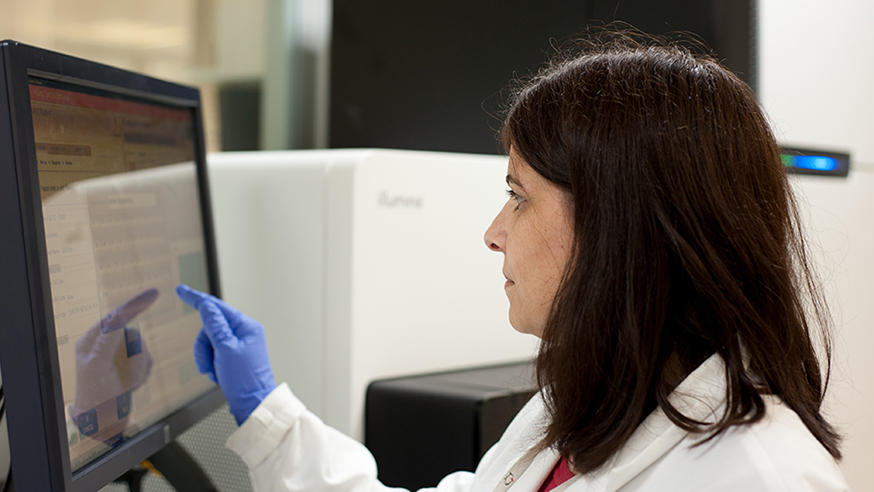
Photo: Jan Chlebik/the ICR
Scientists have developed an easy-to-use software tool that can detect important genetic mutations that previously needed to be identified by a separate test.
The software, called DECoN, accurately and quickly detects changes in copy number of blocks of DNA called exons, by analysing sequencing data already generated to identify smaller gene changes.
It was developed by researchers at The Institute of Cancer Research, London, and the Wellcome Trust Centre for Human Genetics, Oxford.
Most gene mutations are small DNA changes within an exon. These small changes are readily detected by DNA sequencing tests.
But sometimes whole exons are deleted or duplicated. These are called exon copy number variants (exon CNVs), and they are not easily picked up by standard DNA sequencing tests.
Essential variants
It is vital to be able to find these variants because they are an important cause of disease. For example, about 10% of the BRCA1 mutations that predispose women to breast and ovarian cancer are exon CNVs. In clinical testing laboratories a separate test has traditionally been used to detect exon CNVs, but this adds considerable time and cost, and is not available for all genes.
Using DECoN (which stands for Detection of Exon Copy Number variants), the researchers took advantage of the high density of sequencing data available in new gene panels to accurately detect deletions or duplications of exons. DECoN does this automatically, adding only 30 minutes to the data analysis of up to 96 samples, and without costing any more.
The team performed extensive evaluations of DECoN including in more than 1,900 clinical BRCA tests where it successfully detected all the exon CNVs.
Study leader Professor Nazneen Rahman, Head of Cancer Genetics at the ICR and The Royal Marsden NHS Foundation Trust, said: “DECoN has transformed our gene testing pipeline, making it more efficient and more effective, whilst also making it much faster and cheaper. Previously we had to do an additional slow and expensive test to detect these tricky mutations. Now they are automatically detected by DECoN during the data analysis process.”
'A real impact for patients'
Professor Gerton Lunter at the Wellcome Trust Centre for Human Genetics in Oxford, who led the software development, said: “This was an outstanding collaboration for us. It is hugely rewarding to see our work having a real impact for patients.”
DECoN was developed through the Wellcome-funded Mainstreaming Cancer Genetics programme and Transforming Genetic Medicine Initiative. A key element of these programmes is to develop tools that can be easily and freely used around the world.
A paper detailing the development, evaluation and implementation of DECoN was published today in Wellcome Open Research, a newly launched publishing platform that promotes fast, open publication of any useful work by Wellcome researchers.
Professor Rahman added: “It’s very important to us that our work can be as impactful as possible. We have made an easy-to-use version of DECoN freely available from www.icr.ac.uk/DECoN and the source code is also available.”
“We took advantage of the new Wellcome Open Research publication platform to publish our DECoN paper. The paper was freely available for anyone to read and download within two weeks of submitting it. If we had chosen the traditional publishing route it would have taken months. We plan to use Wellcome Open Research for much of our work. We are excited about the faster, broader impact we will have through using the platform.”
Learn more about DECoN and download